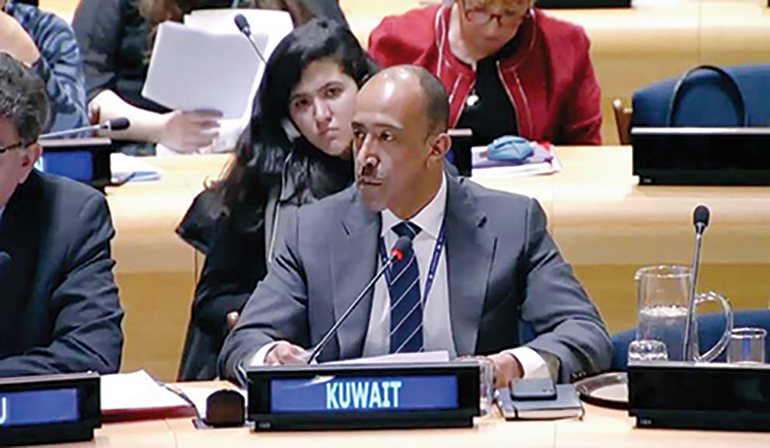
NEW YORK: Deputy
of Kuwait's Permanent Delegate to the UN Counselor Bader Al-Munayyekh urged
world communities to boost UN peacekeeping operations, including women's
empowerment in post-conflict situations. It is important to back peacekeeping
missions in war-torn countries, particularly with holding sexual assault
perpetrators accountable and bringing them to justice, Munayyekh said during a
UNSC session Friday night.
Wartime sexual
violence is one of the most hideous crimes against humanity, especially since
it targets women and children and leads them to a lifetime health, mental, and
physical disorder, he noted. The cumulative effects of such violence could
expand to generations, rule out any chance of achieving reconciliation and
peace, and destabilize societies in the short and long-terms, said Munayyekh.
Terrorist
organizations such as the so-called Islamic State (IS) and Boko Haram have used
sexual violence to terrorize people and finance their criminal operations, he
added. Sexual assault has also been used to target ethnic and religious
minorities and displace them from their original homelands, such as the case of
the minority Muslim community in Myanmar, said Munayyekh.
The international
community and UNSC should bear their responsibilities and do their best to stop
these intentional and systematic crimes and violations against humanity, and
bring their perpetrators to justice, he stressed. So far, UNSC has succeeded in
laying solid standards to thwart sexual assaults in conflict situations, but it
has not implemented them fully yet, said Munayyekh.
He recalled UNSC
resolution 1820 (2008), which affirmed the council's intention, when
establishing and renewing state-specific sanction regimes, to consider imposing
"targeted and graduated" measures against warring factions who
committed rape and other forms of violence against women and girls. Therefore,
it is important to boost cooperation with the UN Secretary-General's Special
Representative on Sexual Violence in Conflict in order to determine
perpetrators of criminal sexual assaults and include their names in regimes'
sanction lists, he added.
The state has a
primary responsibility to protect its citizens from sexual violence in conflict,
Munayyekh said, adding the international community and UN bodies must cooperate
toward building states' potentials, boosting their security and judicial
systems, and revive their civil societies. State societies also have the
responsibility of denounce all forms of violence against women and children,
preserve their full rights, build their abilities toward protecting themselves
and families, and secure their safety when testifying in court against assault
criminals, he added.
Munayyekh
mentioned regional and non-regional organizations' role in stopping sexual
violence in conflict, lauding Arab League's recent efforts to stop all forms of
violence against women, particularly sexual assault, and provide all necessary
resources to rehabilitate sexual violence victims. Achieving justice for war
and conflict survivors is an inseparable part of attaining effective
accountability, which would prevent and stop hideous crimes against humanity,
he said, adding achieving justice for victims of sexual violence in conflict is
also an inseparable part of attaining a permanent peace.
The Kuwaiti
diplomat stressed the importance of bolstering close cooperation between the UN
Action Against Sexual Violence in Conflict and member-states in order to
empower survivors to obtain justice and compensations, respect to their
cultures, care for their physical, mental and social health, and economic
support to reach sustainable justice.
He also expressed
his country's support and encouragement of the efforts exerted by a number of
international bodies specialized in monitoring most dangerous crimes and
violations around the world, including sexual violence, and bringing their
perpetrators to justice.
Next year will
mark the 20th anniversary of UNSC resolution 1325, Munayyekh noted, hoping to
contribute with UN partners in the forthcoming period to attain a quantum leap
in empowering women effectively to achieve peace and stability in the world,
particularly the Middle East region. - KUNA




